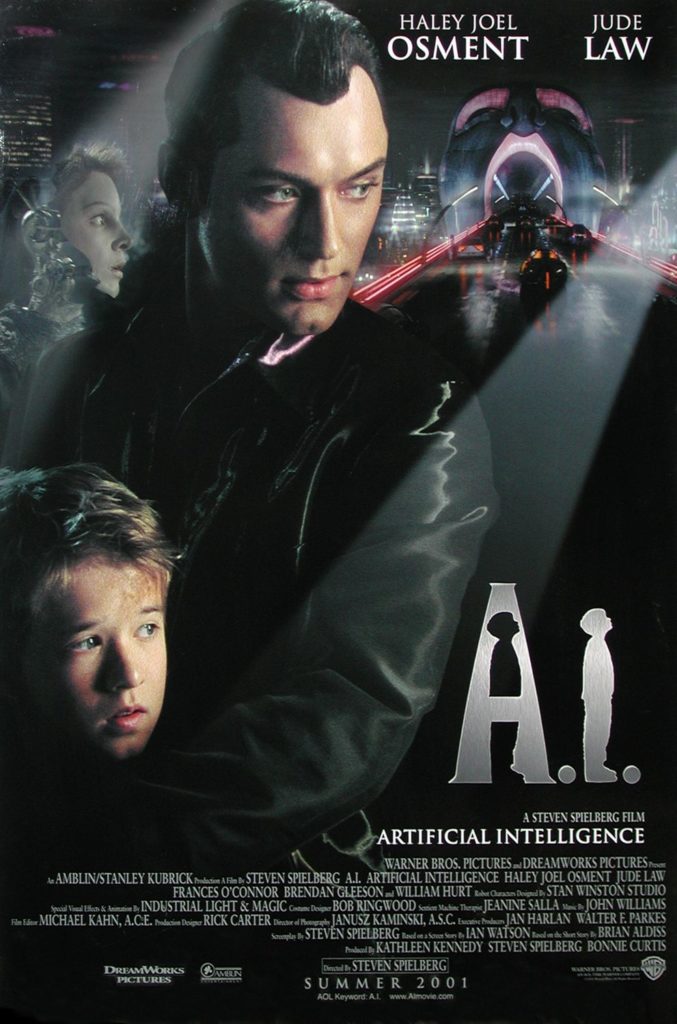In all of the movies in Steven Spielberg‘s filmography, there isn’t one quite like A.I.: Artificial Intelligence, the sci-fi family drama that was released in June of 2001 (20 years ago last month.)

The film had been a longtime project of Stanley Kubrick, especially during the decade between 1987’s Full Metal Jacket and his final film, 1999’s Eyes Wide Shut. But Kubrick died in the spring of 1999, shortly before the release of Eyes Wide Shut, leaving A.I. unmade. Not long after, the surprising announcement was made that the film was moving forward, with none other than Steven Spielberg directing. Kubrick, prior to his death, had passed the project on to Spielberg.
A.I. was not based on the work of Philip K. Dick, although it felt like it was, and it came at a time when Dick adaptations were everywhere. Instead, it was loosely based on Brian Aldiss‘ 1969 short story “Supertoys Last All Summer Long.”
It’s a wildly ambitious film, having things to say about futuristic technology, familial love, and much more, while also merging together the sensibilities of two great but very different filmmakers. It succeeds wildly at the former, while not always landing with the latter.
The Premise
The film’s premise is pretty straightforward: It’s a partially dystopian 22nd century. Robots are rampant, including A.I.-equipped robots used as prostitutes and gigolos. But a robotics company, Cybertronics, has come up with the next step: The first-ever robot that is programmed to love. Should we see him as a human, as a pet, or a toy? Much of the stakes hinge on that very question (Roger Ebert had a middling reaction, for essentially that reason.)
That robot is David (Haley Joel Osment, fresh off The Sixth Sense). When a couple (Sam Robards and Frances O’Connor) send their sick son into suspended animation until he can be cured, they bring in David as a “replacement” son. It’s very much in line with such familiar Spielberg themes as nuclear families shattered, and supernatural forces infringing on such families.
There are inevitable complications when the family’s son, Martin, returns to the home, and rather than return David to the robotics company, his mother leaves him in the woods.
The film’s second act, set at a brutal “Flesh Fair,” is a jarring tonal shift, which many at the time saw as more Kubrickian than the Spielbergian first third. This also introduces us to Jude Law‘s Gigolo Joe, and minor characters played by such notables as Chris Rock, Julia Louis-Dreyfus, and Brendan Gleeson. William Hurt is also in the film, as the head of the robotics firm.
A later detour to Rouge City, featuring the voice of Robin Williams as “Dr. Know,” and a sojourn to the ruins of Manhattan, ultimately leads to the heartbreaking, beautiful epilogue, set thousands of years further in the future:
20/20 Hindsight
I loved A.I. when I first saw it in the theater back in the summer of 2001, but I acknowledge that before popping out the DVD to rewatch it for this essay, that I hadn’t watched the film since. It still holds up, and the scenes with the two “brothers” hit differently now that I’m the father of two boys. But what remains is that the film, shot by frequent Spielberg collaborator Janusz Kaminski, looks fantastic.
As for what it says about A.I. technology, it got things about half-right, with 20 years of hindsight. No, we don’t yet have those types of robots, whether of the David or Gigolo Joe variety, but there are questions about whether major tech companies, especially with their A.I. functions, are up to any good.
A.I. is part of our lives, in giving us movie recommendations and knowing which ads to serve us, although we’re still quite a few decades behind the events of the movie. It’s an ending that’s as Spielberg as can be:
The other cool part of the film’s legacy was “The Beast,” also known as “The A.I. Game,” a multimedia game developed by Microsoft that kept audiences guessing in the months leading up to the movie’s release. Sure, it had just about nothing to do with the movie, but it showed a new way to promote movies that had never been seen before:
A.I. Artificial Intelligence is available to stream from many places, including Amazon Prime Video, Paramount+, YouTube, and Pluto TV. Perhaps an A.I. algorithm will lead you to it soon.




